
10 Warning Signs of Vision Problems in Kids
Did you know that 80% of the material taught in school comes at a student visually? Between books, whiteboards, tablets, and more, vision plays a key role in learning. That’s why school can be incredibly challenging for kids who have eye trouble.
“I tell parents to pay close attention to signs of vision problems, especially as they relate to school,” advises Dr. Rachel Hollenbeck of Grand Rapids Ophthalmology’s Grandville office. “Some students with academic struggles and behavior problems may actually be struggling with undetected vision problems.”
Don’t wait for your kids to bring vision problems to your attention — children assume that the way they see is the way everyone sees, so they may not even realize they’re experiencing issues with vision. Just be aware that vision problems are often accompanied by behaviors that any attentive parent or teacher can spot.
10 Signs of Vision Problems to Watch For:
- Frequent eye rubbing during activities
- Squinting, blinking or closing/covering one eye to see things
- Tilting head to one side to try to see better
- Extreme sensitivity to light and/or headaches
- Poor hand eye coordination
- Consistently sitting close to the TV or holding a book too close
- Avoiding reading and other close-up visual activities
- Losing place when reading
- Difficulty concentrating or becoming irritated with visual work
- Poor reading comprehension
If your child displays or complains of any of these behaviors, get an evaluation from their eye doctor or pediatrician. “Remember,” says Dr. Hollenbeck, “the sooner you treat a vision problem, the more likely the treatment will be successful.”
#1 Way to Protect Your Children’s Eyes
The best way to protect your kids’ eye health is to schedule regular comprehensive eye exams. Children should get their first eye exam as newborns, another between 6 and 12 months of age, and another between ages 3 and 3 1/2. By the time children reach school age, the American Ophthalmology Association recommends an eye exam every two years.
Don’t Depend on School Vision Screenings
Often parents assume that passing a school screening means no problems, but it’s important to understand that these screenings test only for visual acuity. Even if your child tests 20/20 for visual acuity at school, regular comprehensive eye exams with an eye care professional are necessary to catch other vision issues.
Bottom Line: Pay attention to signs of a vision problem so it can be treated early.
The earlier vision problems are detected and treated, the better the success rate. If you notice any of the signs of vision problems listed here, schedule a comprehensive eye exam for your child in the near future.
Schedule an Appointment
Schedule an appointment today to experience the GRO difference. Call 616.588.6598 or click here.





















